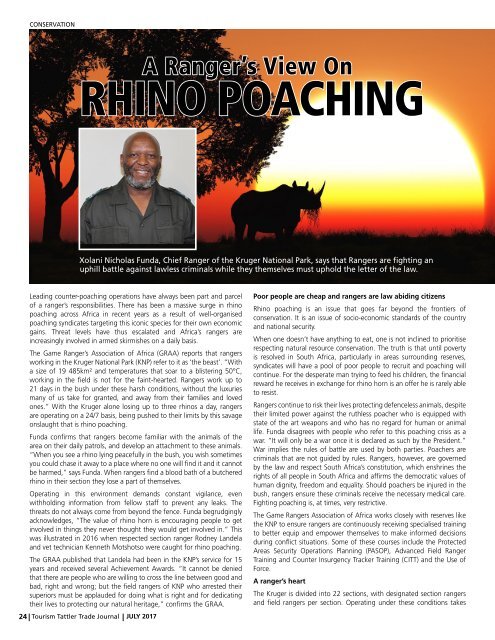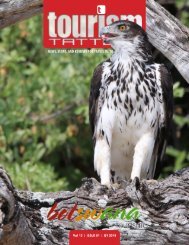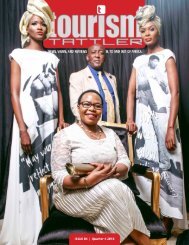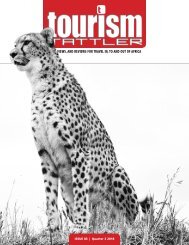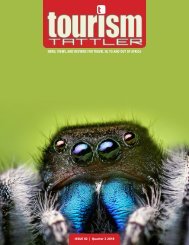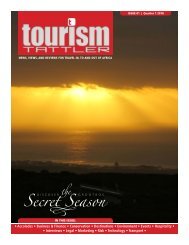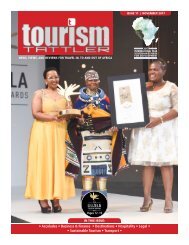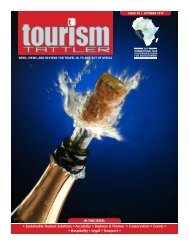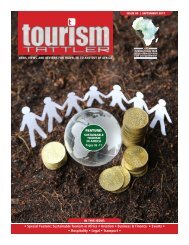Tourism Tattler July 2017
You also want an ePaper? Increase the reach of your titles
YUMPU automatically turns print PDFs into web optimized ePapers that Google loves.
CONSERVATION<br />
A Ranger’s View On<br />
RHINO POACHING<br />
Xolani Nicholas Funda, Chief Ranger of the Kruger National Park, says that Rangers are fighting an<br />
uphill battle against lawless criminals while they themselves must uphold the letter of the law.<br />
Leading counter-poaching operations have always been part and parcel<br />
of a ranger’s responsibilities. There has been a massive surge in rhino<br />
poaching across Africa in recent years as a result of well-organised<br />
poaching syndicates targeting this iconic species for their own economic<br />
gains. Threat levels have thus escalated and Africa’s rangers are<br />
increasingly involved in armed skirmishes on a daily basis.<br />
The Game Ranger’s Association of Africa (GRAA) reports that rangers<br />
working in the Kruger National Park (KNP) refer to it as ‘the beast’. “With<br />
a size of 19 485km² and temperatures that soar to a blistering 50°C,<br />
working in the field is not for the faint-hearted. Rangers work up to<br />
21 days in the bush under these harsh conditions, without the luxuries<br />
many of us take for granted, and away from their families and loved<br />
ones.” With the Kruger alone losing up to three rhinos a day, rangers<br />
are operating on a 24/7 basis, being pushed to their limits by this savage<br />
onslaught that is rhino poaching.<br />
Funda confirms that rangers become familiar with the animals of the<br />
area on their daily patrols, and develop an attachment to these animals.<br />
“When you see a rhino lying peacefully in the bush, you wish sometimes<br />
you could chase it away to a place where no one will find it and it cannot<br />
be harmed,” says Funda. When rangers find a blood bath of a butchered<br />
rhino in their section they lose a part of themselves.<br />
Operating in this environment demands constant vigilance, even<br />
withholding information from fellow staff to prevent any leaks. The<br />
threats do not always come from beyond the fence. Funda begrudgingly<br />
acknowledges, “The value of rhino horn is encouraging people to get<br />
involved in things they never thought they would get involved in.” This<br />
was illustrated in 2016 when respected section ranger Rodney Landela<br />
and vet technician Kenneth Motshotso were caught for rhino poaching.<br />
The GRAA published that Landela had been in the KNP’s service for 15<br />
years and received several Achievement Awards. “It cannot be denied<br />
that there are people who are willing to cross the line between good and<br />
bad, right and wrong; but the field rangers of KNP who arrested their<br />
superiors must be applauded for doing what is right and for dedicating<br />
their lives to protecting our natural heritage,” confirms the GRAA.<br />
24 <strong>Tourism</strong> <strong>Tattler</strong> Trade Journal<br />
JULY <strong>2017</strong><br />
Poor people are cheap and rangers are law abiding citizens<br />
Rhino poaching is an issue that goes far beyond the frontiers of<br />
conservation. It is an issue of socio-economic standards of the country<br />
and national security.<br />
When one doesn’t have anything to eat, one is not inclined to prioritise<br />
respecting natural resource conservation. The truth is that until poverty<br />
is resolved in South Africa, particularly in areas surrounding reserves,<br />
syndicates will have a pool of poor people to recruit and poaching will<br />
continue. For the desperate man trying to feed his children, the financial<br />
reward he receives in exchange for rhino horn is an offer he is rarely able<br />
to resist.<br />
Rangers continue to risk their lives protecting defenceless animals, despite<br />
their limited power against the ruthless poacher who is equipped with<br />
state of the art weapons and who has no regard for human or animal<br />
life. Funda disagrees with people who refer to this poaching crisis as a<br />
war. “It will only be a war once it is declared as such by the President.”<br />
War implies the rules of battle are used by both parties. Poachers are<br />
criminals that are not guided by rules. Rangers, however, are governed<br />
by the law and respect South Africa’s constitution, which enshrines the<br />
rights of all people in South Africa and affirms the democratic values of<br />
human dignity, freedom and equality. Should poachers be injured in the<br />
bush, rangers ensure these criminals receive the necessary medical care.<br />
Fighting poaching is, at times, very restrictive.<br />
The Game Rangers Association of Africa works closely with reserves like<br />
the KNP to ensure rangers are continuously receiving specialised training<br />
to better equip and empower themselves to make informed decisions<br />
during conflict situations. Some of these courses include the Protected<br />
Areas Security Operations Planning (PASOP), Advanced Field Ranger<br />
Training and Counter Insurgency Tracker Training (CITT) and the Use of<br />
Force.<br />
A ranger’s heart<br />
The Kruger is divided into 22 sections, with designated section rangers<br />
and field rangers per section. Operating under these conditions takes


